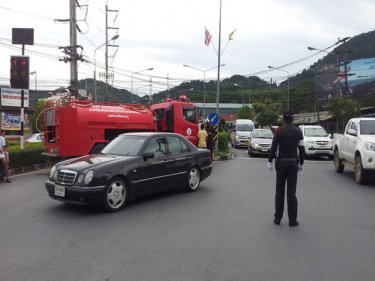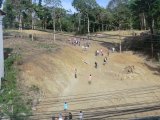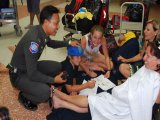PHUKET: Phuket authorities have been criticised for their lack of concern about the potential for a future disaster on Phuket, most likely in the form of a second tsunami.
Concerns were driven home this afternoon by a loud earthquake with its epicentre in Phuket's central Thalang district, according to the Thai Meteorological Centre, possibly as a result of fault line activity beneath Thailand.
The Phuket Director of the Department of Disaster Prevention and Mitigation, San Jantawong, told Phuketwan today that not enough care was being shown by most of Phuket's local authorities.
''Tsunami tower sirens failed to sound last Wednesday in Karon, Chalong, Rawai and Kamala,'' he said. ''This is because local authorities fail to check them. Thieves steal the parts.
''And in Patong, the authorities are great at organising fun events such as Bike Weeks and Songkran water festivals, but do they ever show the same interest when it comes to serious matters? No.''
Khun San's dismal view of the lack of disaster preparedness on Phuket came just minutes before the sharp aftershock rocked Phuket this afternoon, bringing a ready-or-not repetition of Wednesday's evacuation from the holiday west coast.
How Phuket deals with tsunami alerts in future is likely to be decided at a meeting next Monday, when Khun San is almost certain to let those who attend at 1pm at Provincial Hall in Phuket City know exactly what he thinks.
''In the past, all the key people have been invited to meetings by the DDPM,'' he said. ''They usually send someone junior and often they don't stay for more than a few minutes, just long enough to sign in so there is proof that they were there.''
The fact that 5400 people died on Phuket and along the Andaman coast just over seven years ago in the Indian Ocean tsunami appears to be something many authorities and resort managements would prefer to forget.
The wiser ones never will. When it comes to the 2004 tsunami, Phuket people - and those all along the Andaman - tend to fall into two categories: those who cannot forget, and those who do not wish to remember.
The events of Wednesday, when thousands of tourists and residents fled to the hills, and today, when a savage aftershock triggered a similar reaction, may change a few perspectives.
Phuket's tourism future depends on being able to guarantee the safety and security of visitors, and that is only possible if authorities are constantly vigilant and prepared for the worst.
Luckily, Phuket dodged the bullet on Wednesday. Experts said that an earthquake of 8.6 magnitute in that part of the seabed off Indonesia would normally trigger a sizeable tsunami. Aftershocks also proved disturbing, but not threatening.
In Aceh, where 160,000 died in 2004, the terror has always remained real. On Wednesday, people were forced to sit down because the earthquake was so strong.
It's only possible to guess at their levels of fear when they could finally stand up and flee.
So Phuket is relatively fortunate to have had two hours in which to react on Wednesday. If there is less time, or if the next earthquake comes in darkness, an evacuation will be more difficult.
That's why Phuket's authorities need to get it right, and quickly.
One lesson: all the information needs to be disseminated in Thai and English. Those who are being told to evacuate need to know how much time they have - people should flee in an orderly fashion, and only run if the wave is approaching.
Some resorts say they have comprehensive evacuation plans, yet there were comments from readers that some resort staff panicked and ran without helping to evacuate guests.
Phuket Tourist Association president Somboon Jirayoot has suggested that Phuket needs a disaster information centre. It would certainly be useful as a place to turn to in a crisis, and a place committed to preparedness.
And at the least, it could be the place where all kinds of essential information - includining templates for resort evacuations - could be retained and disseminated.
But how will official communication be handled? How will tourists know what to do, and when to do it?
Khun San says the plans laid after the 2004 tsunami have eroded because some officials have moved on and others have changed telephone numbers, so the SMS system is no longer complete.
Heavy wooden beach loungers have been allowed back onto the beaches of Phuket, even though these were regarded as killers when swept up by the big wave in 2004.
Tsunami evacuation signs that once littered the coast are now, in some places, impossible to find.
What the experts say after Wednesday's earthquakes is that there are likely to be more alarms, not fewer.
CNN quoted one seismologist as saying said that Wednesday's earthquake was ''likely to have increased the stress on the plate boundaries near Aceh, increasing the risks of another major earthquake in the same area as the 2004 disaster.''
What this means for Phuket is that tourists need to be reminded they are holidaying in a tsunami zone. Phuket and the Andaman coast remain a great place for a holiday.
Thankfully, there is always likely to be time to evacuate in future alarms. But tourists need to know the answer to that question we have kept asking: if a tsunami comes again at 3am while i am sleeping, who will wake me up and tell me what to do?
It's a question we hope the meeting at Provincial Hall in Phuket City answers next Monday.














Not 'if it happens again', more a case of when. Could be tomorrow or a 1000 years away, but happen it will. Sorry to say, greed and selfishness will inevitably ensure the same result...As I'm writing this our house just shook again - it's 8:30pm
Posted by agogohome on April 16, 2012 20:35